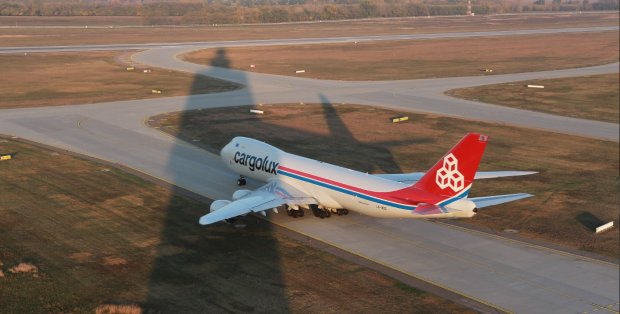Two jumbo jets and whatever else the concrete will hold: new apron for the Cargo City completed

The apron and taxiway, made of basalt concrete, for the BUD Cargo City, Budapest Airport’s soon to be opened logistics base, is big enough to fit six football pitches. No wonder, as cargo aircraft will be handled here following the handover of the world-class logistics base; the massive concrete will be suitable for the concurrent parking of two Boeing B-747-8F type aircraft, with a maximum takeoff weight of 440 tons each.
Two jumbo jets or four narrow body cargo aircraft can be loaded and handled in the huge basalt concrete area built next to Budapest Airport’s new logistics base. The new cargo apron and the adjoining taxiway were constructed using 15 000 cubic meters of basalt concrete. By way of comparison, the same amount of water would be enough to fill six Olympic swimming pools. The apron is made of 65 cm thick basalt concrete, and has great load-bearing properties; it would be safe for as many as eighty African elephants to stand on!
There is little chance of that happening, but the theory illustrates the load-bearing properties of the cargo apron well. The largest aircraft type which can be handled here boasts a takeoff weight of 440 tons, and is capable of transporting one hundred tons of goods – and the apron is able to take two such aircraft at the same time. However, an apron does not just consist of concrete and other building materials; a comprehensive lighting system and optical cable network are also indispensable for operation. If we were to lay out all the cables used in a straight line, they would stretch for sixty kilometers.
“Efficiency – that’s the word that first comes to mind if I think of the BUD Cargo City and the cargo apron. The largest cargo aircraft in the world can be handled seamlessly here; moreover, the new apron is located so close to the logistics base that this can be done much faster than previously,” emphasized René Droese, Director Property and Cargo for Budapest Airport.
Budapest Airport handled an average of 12 000 tons of cargo per month last year. The BUD Cargo City, to be handed over in November, will not only be the most modern and most efficient logistics base in the business, but will also strengthen the leading regional role of Budapest in global freight transport thus promoting economic growth and Hungarian firms doing business around the world.


